|
|
|
Sort Order |
|
|
|
Items / Page
|
|
|
|
|
|
|
| Srl | Item |
| 1 |
ID:
087568
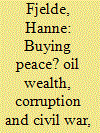

|
|
|
|
|
| Publication |
2009.
|
| Summary/Abstract |
This article argues that, contrary to received wisdom, political corruption is not necessarily associated with a higher risk of civil war in oil-rich states. Political corruption can be used to accommodate opposition and placate restive groups by offering private privilege in exchange for political loyalty. Since oil wealth is associated with large rents accruing in state treasuries, it provides an economic foundation for such clientelist rule. This article thus argues that oil-rich governments can use political corruption to buy support from key segments of society, effectively outspending other entrepreneurs of violence. Based on a logit analysis of civil war onsets, 1985-99, the article finds support for this `co-optation argument'. A negative and statistically significant interaction term between oil production and political corruption is consistent across different models and robust to a number of specifications. While both variables per se increase the risk of conflict overall, higher levels of corruption seem to weaken the harmful impact of oil on the risk of civil war. This finding suggests the need for a more nuanced understanding of the relationship between natural resource wealth, governance and armed conflict. Political corruption has prolonged poverty and bred economic and political inequality in many oil-rich states, but it has also helped cement powerful alliances with a stake in the continuation of the corrupt regimes.
|
|
|
|
|
|
|
|
|
|
|
|
|
|
|
|
| 2 |
ID:
170808
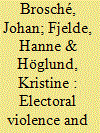

|
|
|
|
|
| Summary/Abstract |
Why do the first multiparty elections after authoritarian rule turn violent in some countries but not in others? This article places legacies from the authoritarian past at the core of an explanation of when democratic openings become associated with electoral violence in multi-ethnic states, and complement existing research focused on the immediate conditions surrounding the elections. We argue that authoritarian rule characterized by more exclusionary multi-ethnic coalitions creates legacies that amplify the risk of violent elections during the shift to multiparty politics. Through competitive and fragmented interethnic relations, exclusionary systems foreclose the forging of cross-ethnic elite coalitions and make hostile narratives a powerful tool for political mobilization. By contrast, regimes with a broad-based ethnic support base cultivate inclusive inter-elite bargaining, enable cross-ethnic coalitions, and reduce incentives for hostile ethnic mobilization, which lower the risk of violent elections. We explore this argument by comparing founding elections in Zambia (1991), which were largely peaceful, and Kenya (1992), with large-scale state-instigated electoral violence along ethnic lines. The analysis suggests that the type of authoritarian rule created political legacies that underpinned political competition and mobilization during the first multiparty elections, and made violence a more viable electoral strategy in Kenya than in Zambia.
|
|
|
|
|
|
|
|
|
|
|
|
|
|
|
|
| 3 |
ID:
183151
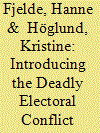

|
|
|
|
|
| Summary/Abstract |
This article introduces the Deadly Electoral Conflict dataset (DECO): a global, georeferenced event dataset on electoral violence with lethal outcomes from 1989 to 2017. DECO allows for empirical evaluation of theories relating to the timing, location, and dynamics of deadly electoral violence. By clearly distinguishing electoral violence from related (and sometimes concurrent) instances of organized violence, DECO is particularly suitable for investigating how election-related violence is connected to other forms of violent political contention. In the article, we present the theoretical and methodological underpinnings of the data collection and discuss empirical patterns that emerge in DECO. We also demonstrate one potential use of DECO by examining the association between United Nations peacekeeping forces and the prevalence of deadly electoral violence in conflict-affected countries.
|
|
|
|
|
|
|
|
|
|
|
|
|
|
|
|
| 4 |
ID:
097767
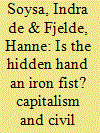

|
|
|
|
|
| Publication |
2010.
|
| Summary/Abstract |
There is surprisingly little empirical scholarship on the spread of capitalistic economic policies under the rubric of 'globalization' and domestic peace. While the classical liberals saw free markets leading to social harmony because of self-interest of individuals, who cooperate for profit, Marxists and others viewed markets as anarchical, requiring state intervention for obtaining justice and peace. The authors argue from an opportunity-cost perspective that the payoffs to rebellion are structured by how an economy is governed. Closed economies are likelier than more open ones to accumulate 'rebellion specific capital' because of high payoffs to organization in the shadows. Using an index of economic freedom that measures how free people are to transact in an economy, the authors find that countries more favorable to free enterprise have a reduced risk of civil war onsets, a result that is robust to the inclusion of institutional quality, per capita wealth, and sundry controls. The results hold up despite a battery of specification changes, alternative data, and testing methods. The findings do not suggest that states under conditions of capitalism lose their autonomy to provide the public good of peace, as skeptics of globalization claim. Peacemakers will do well to build institutions that reward productive investment over rent-seeking, alongside democratic institutions that ultimately gain their legitimacy on the back of good economic performance and well-functioning markets.
|
|
|
|
|
|
|
|
|
|
|
|
|
|
|
|
| 5 |
ID:
173893


|
|
|
|
|
| Summary/Abstract |
In this article, we introduce the Geocoded Peacekeeping Operations (Geo-PKO) dataset, which presents new data on subnational peacekeeping deployment for all UN missions to Africa, 1994–2014. The Geo-PKO dataset is the most comprehensive dataset of its kind and enables scholars to address new questions about peacekeeping operations and their effects by exploring variations in peacekeeping at the subnational level. The dataset offers information on several key features of peacekeeping deployment at the local level, such as data on the size of deployments and how these vary over time, as well as information on the location of mission headquarters, the type of peacekeepers deployed, and which troop-contributing countries deploy to each location. This article describes the data collection process and illustrates some of the many utilities of this dataset for the scholarly community. For example, we show that peacekeeping troops are able to reduce battle-related violence in areas with high road density, suggesting that peacekeepers’ ability to project their power is stronger when they can increase their reach and more easily patrol larger territories. Hence, our data can fruitfully be combined with information such as socio-economic, geographical or demographic characteristics, to further explore how peacekeeping operations can contribute to peace and security in the areas where they operate. By providing fine-grained data on the location of peacekeepers across time and space, the Geo-PKO dataset should help facilitate important inquires that can push the research agenda on peacekeeping forward.
|
|
|
|
|
|
|
|
|
|
|
|
|
|
|
|
| 6 |
ID:
170810
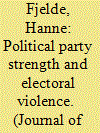

|
|
|
|
|
| Summary/Abstract |
Existing research on the causes of electoral violence has focused on structural determinants and election-specific characteristics but has paid less attention to the role of political agents that contest elections. This study addresses this gap by examining the relationship between the organizational strength of political parties and the risk of electoral violence. The study argues that strong political parties enhance the prospect for peaceful electoral dynamics for two reasons. First, having strong party organizations reduce incentives for violent electoral manipulation because these organizations enable more cost-efficient ways to mobilize voters. Second, strong party organizations constrain political actors from deploying electoral violence, both at the leadership and grassroot levels. The relationship between political party strength and electoral violence is studied by combining global data on the overall strength of political parties in the polity with data on violence across all national elections from 1946 to 2010. The statistical analysis accounts for a number of potentially confounding variables related to formal political institutions and election-specific characteristics. The results point to a statistically significant and substantively important association between strong political parties and a reduced risk of violent electoral conflict.
|
|
|
|
|
|
|
|
|
|
|
|
|
|
|
|
| 7 |
ID:
165160
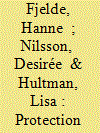

|
|
|
|
|
| Summary/Abstract |
Are UN peacekeepers effective in protecting civilians from violence? Existing studies examine this issue at the country level, thereby making it difficult to isolate the effect of peacekeepers and to assess the actual mechanism at work. We provide the first comprehensive evaluation of UN peacekeeping success in protecting civilians at the subnational level. We argue that peacekeepers through their sizable local presence can increase the political and military costs for warring actors to engage in civilian targeting. Since peacekeepers’ access to civilian populations rests on government consent, peacekeepers will primarily be effective in imposing these costs on rebel groups, but less so for government actors. To test these conjectures we combine new monthly data on the location of peacekeepers with data on the location and timing of civilian killings in Africa. Our findings suggest that local peacekeeping presence enhances the effectiveness of civilian protection against rebel abuse, but that UN peacekeeping struggles to protect civilians from government forces.
|
|
|
|
|
|
|
|
|
|
|
|
|
|
|
|
| 8 |
ID:
113948
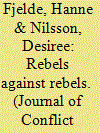

|
|
|
|
|
| Publication |
2012.
|
| Summary/Abstract |
Rebel groups that confront the government frequently become engaged in fierce and violent struggles with other groups. Why does a rebel group who is already fighting with the government become engaged in yet another struggle, thereby sacrificing scarce resources in the fight against other rebel groups? This article addresses this puzzle by providing the first global study on the determinants of interrebel violence. The authors argue that this violence should be understood as a means to secure material resources and political leverage that can help the group prevail in the conflict with the government. The quantitative analysis builds on new data on armed conflict between nonstate actors, 1989-2007. The results show that interrebel conflict is more likely when the rebel group fights in an area with drug cultivation, when the group is in control of territory beyond government reach, when the group is either militarily strong or weak in relation to other rebels, and where state authority is weak.
|
|
|
|
|
|
|
|
|
|
|
|
|
|
|
|
| 9 |
ID:
161547
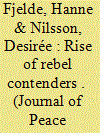

|
|
|
|
|
| Summary/Abstract |
Fragmentation of armed opposition movements through the rise of new rebel groups constitutes a significant challenge to conflict termination and peacebuilding. Yet, the question of why some rebel movements remain cohesive whereas others see a number of contending groups during the course of the armed conflict has received limited attention in existing research. This article addresses this gap by analyzing the determinants of the rise of rebel contenders in intrastate armed conflicts worldwide, 1975–2013. The theoretical framework focuses on barriers to entry, that is, variations in the costs and disadvantages that must be borne by nascent rebel contenders that are not borne to the same extent by incumbent rebel groups. The study proposes that strong social networks underpinning incumbent groups create structural barriers to entry for nascent groups by aggravating challenges of organization building. It further suggests that the interaction between incumbent groups and the government influences strategic barriers to entry as changes in government policies produce windows of opportunity for nascent groups to form. Consistent with these arguments, the study finds that when incumbent groups have strong networks – because rebels either tap into ethnic networks or draw on a leftist ideology – the risk of fragmentation is lower. Furthermore, when the government accommodates groups, through either negotiations or democratic concessions, the risk of fragmentation increases.
|
|
|
|
|
|
|
|
|
|
|
|
|
|
|
|
| 10 |
ID:
134936
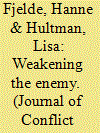

|
|
|
|
|
| Summary/Abstract |
While case-based narratives from civil wars often stress the ethnic dimension of civilian atrocities, cross-national studies have found limited evidence in support of such contentions. Addressing this debate, we argue that warring actors often use ethnic affiliation to identify groups of suspected enemy supporters when individual wartime affiliations are not known. Since warring actors depend on their civilian constituencies for support, collective targeting of the enemy’s co-ethnics becomes a strategy for weakening the enemy’s capacity. Armed actors are thus more likely to engage in civilian abuse in areas where the enemy’s ethnic constituency resides. To examine this argument, we combine new georeferenced event data on violence against civilians in African conflicts, 1989–2009, with spatial data on the location of the warring actors’ ethnic constituencies. The analysis shows that the number of civilians killed by both governments and rebel groups is higher in areas inhabited by the enemy’s ethnic constituency.
|
|
|
|
|
|
|
|
|
|
|
|
|
|
|
|
|
|
|
|
|